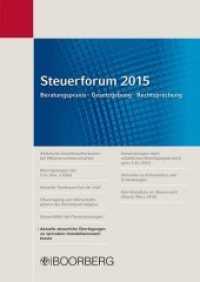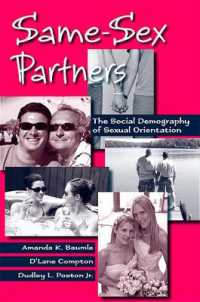- ホーム
- > 洋書
- > 英文書
- > History / World
Full Description
This book explores the lessons that can be gleaned through a look from the East Central European experience of dissent for dissent and resistance as general modern phenomena.
Lessons from the Revolutions of 1989 in East Central Europe has a two-fold purpose: (1) to teach about, in an accessible way, the East Central European culture of dissent, and (2) to explore connections between that time and place and our own post-1989 globalized world where dissent and resistance are more prominent and necessary than ever. Scholars of the pre-1989 East Central European culture of dissent do not, as a matter of course, look for lessons in their subject, and the scarcity of scholarly literature that explores this angle only confirms our point. At the same time, this avoidance, perhaps for good methodological reasons, does seem rather odd. Why not try to draw lessons—for us in the here and now—from studying the cultural-historical space of pre-1989 East Central Europe? This question seems especially important given that the intellectual dissidents did not think that what was happening in their time and place was isolated from the modern world as a whole: they thought that there were lessons to be drawn for the "West" from the experience of the "East."
Contents
Editors' Introduction
Chapter 1: James Krapfl, "What to Do When You Find Yourself in a Revolutionary Situation"
Chapter 2: Kieran Williams, "Space and Revolution"
Chapter 3: Delia Popescu, "Time and Revolution"
Chapter 4: Lavinia Stan, "Transitional Justice after Post-Commmunist Revolutions: Three Lessons"
Chapter 5: Lukasz Wodzynski, " 'Us vs Them'? The Legacy of Martial Law in Contemporary Polish Literature"
Chapter 6: Muriel Blaive, "Can Democracy Emerge from Dictatorship? The Shadow of Communist Practices in the Czech Republic after 1989"
Chapter 7: Padraic Kenney, "Where Have All the Flowers Gone? Global Anti-Authoritarian Protest Before and Since 1989"
Chapter 8: Barbara J. Falk, "Non-Violence and Violence: Learning and Unlearning 1989"
Chapter 9: Richard Andrew Hall and Andrei Ursu, "The Romanian Revolution of December 1989: The Failed Counterrevolution of Nicolae Ceausescu's Securitate 'Stay Behind' Force"
Chapter 10: Aspen Brinton, "Art and Transcendence: How Art Helped Create the Revolutions of 1989 and How It Can Shape Revolution Today"
Chapter 11: Amy J. Hughes, "A Haunted Site of Modernity: Affective Dissent and the Legacies of Trauma in Czechoslovakian Public Monumental Sculpture"
Chapter 12: David S. Danaher, "Language Matters"








